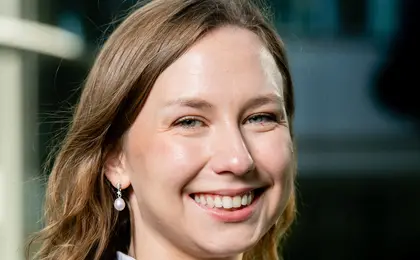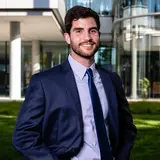Making a Difference: Pitching in at a New Haven Soup Kitchen
We talked with Celeste Watkins ’24 about what she has learned volunteering with Downtown Evening Soup Kitchen.

In this series, we talk to Yale SOM students about how volunteering complements their business education and connects them to their community.
Student: Celeste Watkins ’24
Organization: Downtown Evening Soup Kitchen
What drew you to this particular volunteer opportunity?
I was attending a street fair in downtown New Haven when I recalled hearing about Downtown Evening Soup Kitchen from Morgan Yucel ’23, the Yale SOM Student Government second-year community service chair. I decided to check out their booth at the fair and get some contact information.
The organization serves dinner to the local community five nights a week and runs food pantries. I was part of a team of Yale SOM students who worked at the Olive Street Pantry. We helped set up tables, made the fresh food displays look appealing, and answered questions from visitors. My role was to help visitors up and down stairs when they had too many items or used assistive devices.
What are the values that motivate you to volunteer?
My grandparents were all very involved with the community—not only to develop themselves as people, but to engage with their peers and others. Being involved with helping others has always served as an outlet for me to create meaning in my life and ground myself.
How does volunteering complement your MBA education?
Volunteering is a nice mental break from the demands on an MBA student’s time. It’s important to realize that the work we do is not in a vacuum, and that decisions we make can affect those who don’t look, speak, think, or act like us. Being confronted with challenges that we can take on together outside of the classroom is another way for us to build community in the MBA program.
What’s one surprising thing you have learned through volunteering?
One thing that I learned is that we’re quite privileged to live in the Yale bubble. People of all walks of life use the Olive Street Pantry services. It’s especially worrisome to see the elderly, infirm, and families with young children needing these services. It certainly galvanizes me to want to be sensitive to community needs when planning volunteering events. I’ve been very fortunate to work closely with Dwight Hall, which is a hub for volunteer and social justice work at Yale.
What have you learned about the City of New Haven through volunteering?
I learned that sometimes our volunteer aspirations are not in alignment with what the community really needs. It’s important to be humble and curious about volunteer opportunities—leading with the purpose of serving others and not ourselves.



